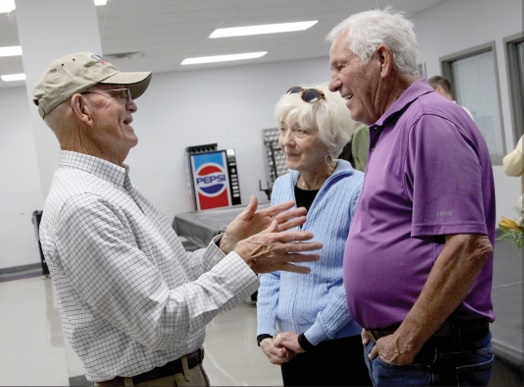Yma Sautbine: State Rep. District 158 Questionnaire No. 2

Publisher’s note: The following Q&A represents the candidates’ views verbatim, as submitted via email in response to our questions, and has not been edited. Questionnaires containing 10 queries, with the intent to run five on Oct. 16 and five on Oct. 23, were sent to State Rep. candidates Scott Cupps, R-Shell Knob (incumbent), and Yma Sautbine, D-Eagle Rock, as well as State Sen. candidates Mike Moon, R-Ash Grove (incumbent), and Ron Monnig, D-Eagle Rock. Candidates were given nine days to return their answers. Sautbine was the only candidate who submitted responses. The General Election will be held Nov. 5. – KT
Age: 53
Current Occupation: Small Business Owner (of Pirate Sand Bar)
Past Experience: Working on numerous political campaigns
Education: Two years of college
1. Are you satisfied with the state budget and spending practices? Where would you like to see changes, if any?
Obviously, I want to see more budget to address the issue of crime and drug-addiction related disturbances that plagues our district. I am glad that monies are being allocated for the treatment and prevention of opioid-related addiction. However, opioids are only one part of the problem. In our district, most of the drug issues that are causing public disturbances relate to methamphetamines (which, granted, are sometimes taken with opioids, like fentanyl). We need budget and resources to specifically address the unique problems that the use of methamphetamines and other stimulants pose to non-using members of the community and to public safety.
2. In what ways do you intend to support small businesses in your district?
The chief way I intend to support small business is by dealing with our crime and drug-addiction problem. In the event of a minimum wage increase, I also support tax-subsidies for local businesses, particularly in rural areas. If the state has an interest in making sure that people can earn a living wage—it should also have an equal interest in making sure that small businesses can afford to stay in business. In my opinion, if wages and the profitability of small business are not both supported, both will falter.
3. Would you support or oppose legislation implementing school choice in Missouri?
I’m glad Missouri is finally raising teacher pay, which has been too low for too long. These significant salary increases coming next year are a good step. Before we think about adding school choice programs, I want to see how these pay raises affect our schools. I’m not totally against school choice, but I’m worried about wasting taxpayer money. We don’t want to pay teachers more if students leave their schools, leaving those teachers with less work to do. Let’s wait and see how the higher salaries change things before we make any other big changes to our schools.
4. How do you intend to vote on Amendment 3, “The Right to Reproductive Freedom Initiative,” and why?
I intend to vote yes for Amendment 3. In my view, it affords balanced protections to pregnant mothers, healthcare providers, and to the unborn. OB/GYNs are leaving our district because they are fearful of being prosecuted for providing medically necessary procedures. This leaves women without doctors for screenings and other basic care. Furthermore, to be frank, I find it repugnant that my opponent wants to go after medical doctors— rather than addressing the actual crime and drug related issues that happen here all the time.
5. What is your opinion of the land-application of wastewater residuals in the area and permit applications for biosolids applications?
The land application of biosolids and wastewater needs to be carefully regulated, especially since a lot of land is owned by foreign companies or individuals. These materials can contain harmful substances like PFAS, which are long-lasting chemicals that can contaminate soil and water. Heavy metals and other dangerous pollutants may also be present, posing severe environmental risks. If we don’t control how these materials are used, foreign landowners could spread foul-smelling and potentially toxic substances on their properties whenever they want, either to protest laws they don’t like or to harm our economy. This isn’t just about managing waste or helping farmers. It’s a bigger issue that could affect our whole society and economy, including important natural resources like Table Rock Lake. This lake generates over 900 million dollars annually in tourism revenue, and we need to protect it from potential contamination. We must be very careful about allowing these practices and put strict limits in place. If we don’t, some people might use these materials in harmful ways that could damage our communities, pollute our environment, and hurt our economic stability.




